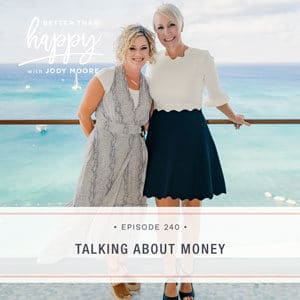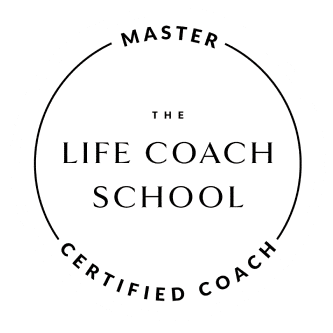Podcast: Play in new window | Download

It’s not just that she’s made a lot of money. Sure, that’s fun to watch. But what really has made the difference in my life is her willingness to talk about money. I don’t mean talking money in a vague way. In fact, the way she talks about money would have made me pretty uncomfortable before I met her.
I don’t mean you have to go around bragging about how much money you have. But I want you to understand why it’s worth questioning the belief that money is some sort of a taboo subject. So, join me this week to discover the other side of this discussion and how talking about money more openly could actually be an opportunity for growth.
Join me for the next Ask Jody Anything coaching call!
What You’ll Learn on this Episode:
- How a lot of us have been brought up to think about talking about money.
- Why we should question our beliefs around money and talking about money.
- How being open to talking about money can create an opportunity for growth.
- What thoughts contribute to a scarcity mindset around money.
- Why the money that people are willing to pay you is an unarguable indicator of the value you bring to the world.
- The ways my life has changed since I started working on my money mindset.
Mentioned on the Show:
- Join me for the next Ask Jody Anything coaching call!
- Brooke Castillo
I’m Jody Moore and this is Better Than Happy episode 240: Talking About Money.
This podcast is for people who know that living an extraordinary life is not easy or comfortable. It’s so much better than that. This is Better Than Happy and I’m your host, Jody Moore.
Hey, everyone. Welcome to the podcast. I want to talk about money today. We’re not just going to talk about money, we’re going to talk about talking about money. How does that sound? So, the reason I wanted to talk about this topic is I actually had the opportunity to go and teach at Master Coach training through the Life Coach School recently.
Brooke Castillo holds Master Coach training, or at least she did this time, in the Cayman Islands. It was like winning the lottery to get to go to the Cayman Islands, work with a group of amazing coaches, both the coaches going through the program, and the other instructors, and Brooke, and just spend the week there.
We took the kids, and the husband came, and it was amazing because we were in a beautiful place and we were doing what I love. Can’t think of anything better. But, at any rate, while we were there, there was a photographer who took a few photos.
And so, I recently got back, from the Life Coach School, a couple photos that they gave me. One of them was a photo of Brooke and I, which I cherish, because Brooke Castillo does not do selfies. I have known her for a long time, I’ve worked pretty closely with her, she’s changed my life, and yet, I have very few pictures of myself and her.
She knows that, I always tease her. She’s like, “Come on, Jody, we’re going to do a selfie.” So, at any rate, I got this photo back, which I’m going to post on my Instagram account. Probably by the time this podcast airs, it will already have been posted, so you can go check out my Instagram account, which is JodyMooreCoaching, if you want to see a lovely photo of Brooke Castillo and myself.
But, as I was thinking, actually just this morning, about when I post that photo on Instagram, what I want the message to be, because I don’t just post photos of myself to indulge myself. I post photos and then I try to give some kind of a message or tool or thought that I think will be helpful to everybody following my Instagram account.
So, as I was thinking about what I wanted to say about this photo of Brooke and myself, so many things that I can think of. I have so many emotions and thoughts about Brooke and what she’s taught me, but what stood out the most to me was the way she helped me change my mindset about money, and the way she helped me change my relationship with money, thereby changing my result with money.
And I was thinking about how she did that, and it really is through example, which is kind of fun because for those of you who aren’t familiar with Brooke, her whole purpose, her drive, her why for doing what she does in the world, is to be an example of what’s possible.
And I was thinking about this with regards to money, and how she really has been an example of what’s possible. And it’s not just that she set the example by going out and making a lot of money. That’s fun to watch, and it’s fun to see that you can make a lot of money and be a genuinely good person, and have an amazing heart, and care about others, and be generous, and kind, and giving.
But what probably helped me the most to do my own work on my relationship with money and my thoughts about money is her willingness to talk about money. She talks about money all the time. And she always has, as long as I’ve known her.
It’s one of the things that when you first meet Brooke, or start listening to her, she has an amazing podcast, The Life Coach School podcast, or maybe you go through one of her programs or something, you’re going to hear her talk about money a lot.
Not just talk about money in a vague, general way, but she talks about money in ways that, I don’t know about you, but I sort of grew up in a society that taught that you shouldn’t talk about money that way. Right? We’re not supposed to talk about it.
We’re not supposed to share with other people how much we make. It’s our own private business. In general, I would say, in my generation, parents didn’t share with their kids how much money they made. It was sort of a topic that you weren’t supposed to talk about, and I think that is still generally the case in most people’s minds.
Now, I think maybe there are some good reasons for that. On the other hand, maybe not. So, what I want to recommend is not that you necessarily have to start talking about money, not that you have to walk around and start telling everyone how much money you make if that doesn’t feel genuine, and right, and good to you. Please don’t hear me say that.
What I want you to know is that this whole idea of we don’t talk about money, we don’t tell people how much money we make, is something that I just want you to ask yourself, “Why not?” And again, maybe you have reasons that you like, and so you continue to do that. Great. I’m all in.
But I want you to understand why not. I don’t want it to just be, “Well, that’s just what I was taught. That’s just what my parents did. That’s what my grandparents did.” That’s what we’ve always done is, in my opinion, one of the worst reasons to keep doing something. I want you to know the reason why and I want you to make sure you like it, okay?
So, when Brooke talks about money, she shares specific details about how much she makes. She even shares specific details about how much of that is profit and how much of it is expenses, and what she chooses to do with her money. Now, her reason for sharing that isn’t to brag, it isn’t to try to make people feel less than or build herself up in some way.
It has nothing to do with that, and it’s very obvious that that’s not her reason when she talks about it the way she does. She talks about money because she’s trying to offer to all of us listening her belief system about money. And she’s trying to change our views about money.
Many of us grew up, again, in a society that had some ideas about money that are now holding us back. All these ideas that money is hard to get, you’ve got to work really hard to make money, we need to be really careful with our money. Money doesn’t grow on trees. Money’s hard to come by. We don’t do that thing because it costs a lot of money.
Now, again, if some of those beliefs are serving you, by all means, keep them, but most of those are coming from a scarce place, a scarcity mindset, and we’re going to create, remember, in our lives, the reality of whatever we believe.
So, Brooke talks about money in such a way that she says, “Money is easy to get, and it’s super fun to make, because the more money you make, the more value you’re putting into the world. So, money is just an indicator of how much value you’re putting out into the world.”
And it’s a great, really concrete, specific, non-arguable measure of how much value you’re putting into the world. It’s not subjective, it’s not up for opinion, it’s not loaded with feelings, like, “Well, this feels good. This feels right.” No, it’s very concrete. People pay money for things that they value, and they don’t pay money for things that they don’t value.
So, the more money someone’s paying you in whatever form you make money, the more value that means you’re offering to a certain person, or to an organization, or to a group of people. Value out equals money in. Okay? So, it’s a great indicator of am I creating value.
And when we’re making more money, it means we’re contributing more value, which is pretty fun. That’s a great thing, right? Who doesn’t want to put more value into the world? I know I do. The other thing that money is an indicator of is how much you have evolved as a person.
Now, this isn’t to beat yourself up. This isn’t to say that if you’re not putting a lot of value out yet, or if you haven’t evolved as much as you want to, that you should feel badly about that. That’s not what I’m saying at all. It’s simply an indicator of, “Okay, maybe I want to take a look at this. Maybe I want to continue in this direction.”
I think you have to be patient. I think it takes time to figure out how you can best put value into the world, and then to go out and create that, and figure out how to find the people that are going to find even valuable. It takes time to evolve yourself. All of these things can take time.
Anyway, so I don’t want you to think that it means that you’re less than or better than. That’s not what we’re saying here at all. We’re talking about where somebody is in the progression of the goals that they’re trying to achieve. Okay?
So, I remember a couple of years ago when my business was doing pretty well. I was getting some momentum. I had a lot of clients. I was starting to transition from coaching one-on-one clients into the group program that I coach in now.
And Brooke said to me, “I think you should make a million dollars this year,” and I was like, “What?” I think at that point I was making about $300,000 a year in my business, which I was thrilled with. That was more money than I had ever made in my life. More money than I ever even thought about making or envisioned myself as capable of making, and, I know, more money than most people make.
So, I was super happy with how much money I was making. But when Brooke said to me, “I think you should make a million dollars,” my head, a little bit, exploded, like, “I don’t know if that’s even possible. I don’t think she understands. I’m a stay-at-home mom with a laptop.”
I sort of had all that kind of drama, but the fact that Brooke believed in me that way and the fact that Brooke talks about money in this way, like, “Yeah, why not? Let’s make a million dollars.” Not like, “We’ve got to do it because we’ve got to prove something to the world,” or, “We need to prove something to yourself,” or, “You’ll feel so much more successful,” or, “You’ll be better, happier in some way once you make a million dollars.
No, that’s never the energy behind it. She was just like, “Wouldn’t it be cool if we did? I bet you could. Look what you’ve done so far. I bet you’re capable of making a million dollars. And, if you did that, think about how much more value you would have to put out into the world and think about who you would become in the process of it.”
Wouldn’t that be cool? Let’s do that. Why not? Because we can just coast and keep doing what we’ve always done, or we can push ourselves and evolve and grow, and try to figure out how to contribute more in the world, and why wouldn’t we want to do that?
So, I borrowed her belief that making a million dollars isn’t a big deal, it’s totally doable, and that you don’t have to be a unicorn to do it. You don’t’ have to work harder. You don’t have to work longer hours. In fact, she sort of insists that you don’t work harder and you don’t work longer hours.
It’s not about grinding harder. It’s about evolving yourself. It’s about thinking bigger, thinking differently. That’s the way to do it. We’re not talking about burning ourselves out here. We’re not talking about having our work/life balance be off to where we’re never spending time with our families.
No, we’re not talking about any of that. We’re talking about how do we take everything to the next level, starting with our own thinking, starting with the way we think about what we do and how we help more people in the world. So, Brooke’s whole willingness to talk about her own journey of going from $300,000, to $1 million, to $10 million, to $25 million, as I’ve watched her do over the past few years.
It sort of gave me permission to think differently about money. I’m so appreciative of that. She didn’t have to do that. She didn’t have to share with me how much money she was making and what she was thinking as she went through each phase.
Not only the thoughts that helped her get there, but the challenges, and the struggle, and the doubt, and the failure. She shares all of it so openly that it really creates a space, or it has anyway for me, in my head, to think differently about money, and to think about my own relationship with money, and my own ability to make money. I am so grateful to her for that.
The other thing I want to add that she taught me, I think you guys might find valuable, is for some reason, and I talk to a lot of new entrepreneurs who have this mindset that they feel bad charging someone money because they’re helping people.
They think, “Well, I shouldn’t profit off of this help that I’m providing. I should just provide help for free.” And I would say, “You totally can provide help for free if you want to, but also, the way our world works is money. If you want to eat and live indoors, at some point you’ve got to charge money for something. That’s how we all support ourselves. That’s kind of the system that we operate in.”
And, I don’t see anything wrong with charging money for helping people, because what are we saying, we should only charge money for things when it doesn’t help people? We should charge more if it’s going to hurt some is what this logic teaches, right? Which makes no sense. I think the more you help someone, the more valuable it is and the more money they’re going to be willing to pay for it.
Again, I know a lot of you listening to this podcast are members of the church, and so sometimes we get stuck in, “Well, where are we crossing the line between wanting to serve as Christ did selflessly, and giving of ourselves, and turning our lives over to Christ, and being greedy and selfish and pursuing things for our own interest?”
And only you know the answer to that question. Only you can decide where that line is. Only you are the one who can check in and determine, “What is my motivation for what I’m doing?” and, “Does this feel Christ-like and giving, and righteous, or does this feel selfish and greedy?”
I don’t think that at least most of the people that I work with are selfish, greedy people, but sometimes we’re trying to pursue something, or make more money, or achieve some kind of a goal in order to feel good about ourselves. And I just want to offer to you that that is getting into the territory of self-serving, right?
Whereas when I’m providing this service because I love doing it, I’m good at it, I like helping people, and I can make money doing it, I think that’s a beautiful thing. I always like giving the example too of President Nelson, who’s our prophet. And he, in his prior career was a heart surgeon.
He did not perform heart surgery for free, is my guess. At least not most of the time. Even though he could’ve, even though he was really helping people, he didn’t do that. He understood the value of money, and the importance of money, and that it’s not wrong or evil to charge money for things.
It also doesn’t mean that you can’t give some things away and do service for free if you want to as well. I try to find the balance of that in my business. I speak to church groups all the time, I’ve had bishops reach out to me in my local area, saying, “Would you be willing to reach out to this young woman, or this particular individual? They mentioned you and they’re struggling.”
I’m all in on doing things like that where I can, where it’s reasonable. But then there are other things that I charge money for. And here’s the thing, my clients get so much more value out of it because they’re paying money. It’s so funny, my husband and I have, as we run our business, we have a small group of what we call family and friends, some of my best friends and some of my family members who we’ve given free access to my coaching program.
I’ve had this coaching program for over three years now. So, my husband went back, he’s just cleaning up the back end of our business a little bit. He went back to the friends and family free bucket, and there’s just a handful of people in there, and he said, “I took most of them out, because most of them don’t use it at all. There’s a couple that use it and most everybody else doesn’t, and so I just cleaned it out.
I was like, “Yeah, that sounds good.” Now, my guess is that if they were paying money for it, they would be using it, right? But that’s just how we operate as human beings. We just take for granted things that are free. We don’t value them. We don’t show up for them in our own lives.
When I charge my clients money, I don’t think of it as I’m taking something away from them. If you think of it that way, that’s, again, coming from a scarcity mindset. If you think that you’re punishing someone by charging them money, or you’re taking something away, then you’re going to struggle and your relationship with money’s going to reflect that, and it doesn’t serve you or your client to think about it that way.
I don’t think about it that way at all. I think about it as, “This is going to help you get the value out of this and the money, remember, is a result of the value I’m putting into the world.” It just comes to me in different ways. It comes to me through certain clients, or it comes to me in other ways.
I’m not taking money away from anyone. So, should we be talking about money more? Should we tell our kids how much we make when they ask? Should we be more specific about money? I don’t know. Again, it’s up to you to decide. I just like to question in my mind, “What feels like abundance? What feels like I’m offering my kids the kind of relationship with money that I think will serve them best in the end?”
And again, always checking what is my motivation behind it. So, sometimes my kids ask me about money, and I share with them a lot of specifics and a lot of details, and other times I don’t, because I’m still navigating it myself. I don’t want them to think that money is the most important thing. I don’t want them to think that it’s more important than who they’re becoming, or even to believe that it’s going to make them happier in some way.
I don’t want them to have their own doubts and fears about whether or not they’re making enough money. None of that really matters. But again, I don’t get to control the story they believe in the end, but I’m trying to offer them my version of the story that I think might serve them best.
I’m just up for questioning it. I’m up for not assuming that we should never talk about how much we make, that maybe there are times when it’s useful. One of the things that Brooke asked myself and some of my fellow coaches recently, as she’s writing a book that she’s working on, is she said, “Did anyone ever ask you, when you were a young girl, how much money you want to make? And if not, I wonder why not.”
And she pointed this out that I don’t think we ask kids mostly in general, but especially not little girls, how much money do you want to make? We’ll ask, “What do you want to be? What do you want to do when you grow up?” but we never ask that question, “How much money do you want to make?”
And I wonder why not. Do we think that there’s something wrong with wanting to make a certain amount of money? And one of the reasons why I think Brooke thinks it’s such a valuable question is because, again, whatever we focus on, we’re going to create in our lives.
And so, setting a money goal gives you somewhere to aim for, and it helps you stretch yourself towards the potential that you have and the value you’re able to put out in the world if it’s managed correctly, if you’re thinking about it correctly. So, she loves that question. She asks me that question all the time. She asks all of us coaches that question.
She shares with us how much money she wants to make. She has a goal of making $100 million dollars in the next 10 years. Not over the course of 10 years, but within the next 10 years she will have $100 million in annual revenue in her business, and I have no doubt that she will achieve that.
She talks about it all the time. She talks about where her belief system is around it. She talks about why she has that goal. I find it to be really inspiring to hear her share it. The last example I want to give, because this episode is sort of centered around what Brooke taught me about money, but I wanted to share a story with you just to give you a little bit more insight into the kind of person that Brooke is.
I was recently able to go to Mexico with her. She and I have a mutual friend who turned 50, and so Brooke set up this amazing trip, which she paid for, for all of us on the trip. I mean, more glamorous than any vacation I will probably ever go on. She’s so generous. When we were there in Mexico, one day we went to lunch at this little restaurant that was located right on the beach.
And so, locals would walk by as we were eating lunch, selling various things. Jewelry, and toys, and clothing, and things that they were selling. And Brooke kept saying, “No, no, go away. Come back after we’re done eating. We’ll buy something when we’re done eating.”
And once we were done eating, they came back, and you always have to barter with how much you’re going to pay for the item. Brooke was bartering with this woman. She was buying a swimsuit cover-up and the woman wanted, I think $40, and Brooke was talking her down, and they were going back and forth like this.
Brooke got her down to about $15 or so and then she handed the woman a $100 bill, and she said, “That’s for you and your family.” The woman put her hands over her face and started sobbing, and said, “Thank you. Thank you.” And Brooke said, “Oh my gosh, you’re so welcome.”
That’s just how she is. She’s so generous. Yes, she loves money, but she loves to make money, she loves to spend money, she loves to save money, and she loves to give away money. To me, she is a real inspiration of how you can make a lot of money by doing a lot of good in the world, and you can talk about money in a way that inspires people.
I am just so grateful to her because I’ve been able to borrow her beliefs and then develop my own version of them. All right, you guys, have a beautiful, amazing rest of your week. I’ll be back next week with another episode. Until then, make sure you subscribe, tell a friend, come see me on Instagram, all the things. I love you guys. I’ll see you soon.
If you have a question about something you’ve heard me talk about on this podcast or anything else going on in your life, I want to invite you to a free public call, Ask Jody Anything. I will teach you the main coaching tool I use with all of my clients and the way to solve any problem in your life. We will plug in real life examples.
Come to the call and ask me a question anonymously, or just listen in. Go to JodyMoore.com/askjody and register before you miss it. I’ll see you there.
Enjoy the Show?
- Don’t miss an episode, follow on Spotify and subscribe via Apple Podcasts, Stitcher or RSS.
- Leave us a review in Apple Podcasts.
- Join the conversation by leaving a comment below!








